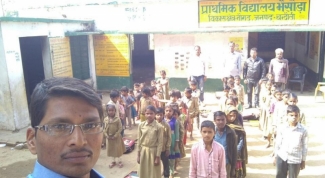
The Government of India, Government of Tamil Nadu (GoTN) and the World Bank have signed a $287 million loan agreement, on Tuesday, for the Tamil Nadu Health System Reform Programme. The programme aims to improve the quality of health care, reduce the burden of non-communicable diseases (NCDs), and fill equity gaps in reproductive and child health services in Tamil Nadu.
Tamil Nadu ranks third among all Indian states in the NITI Aayog Health Index which is reflected in vastly improved health outcomes. The state’s maternal mortality rate has declined from 90 deaths per 100,000 live births in 2005 to 62 deaths in 2015-16 while infant mortality has declined from 30 deaths per 1000 live births to 20 in the same period. A key contribution to these achievements has been the establishment of emergency obstetric and neonatal care centres and the 108 ambulance service with previous support from the World Bank. These have ensured that no mother has to travel more than 30 minutes to access emergency obstetric and neonatal care 24 hours a day, seven days a week.
Despite these impressive gains, certain challenges in health care remain, including quality of care and variations in reproductive and child health among districts. Tamil Nadu is also dealing with a growing burden of NCDs as they account for nearly 69 percent of deaths in the state.
The Tamil Nadu Health System Reform Program will support the state government to:
- develop clinical protocols and guidelines;
- achieve national accreditation for primary, secondary, and tertiary-level health facilities in the public sector;
- strengthen physicians, nurses and paramedics through continuous medical education;
- strengthen the feedback loop between citizens and the state by making quality and other data accessible to the public.
“The programme supports interventions to strengthen institutional and state capacity to achieve results. Good practices and innovations from Tamil Nadu are being scaled up while others from around the world are being introduced through the programme to improve management of the state public health sector, increase transparency, and strengthen accountability,” said Hisham Abdo, Acting Country Director, World Bank.
The programme will promote population-based screening, treatment and follow-up for NCDs, and improve monitoring and evaluation. Patients will be equipped with knowledge and skills to self-manage their conditions. Lab services and health provider capacity will also be strengthened to address mental health. To tackle road injuries, the programme will improve in- hospital care, strengthen protocols, strengthen the 24x7 trauma care services and establish a trauma registry.
Another key aim of this programme is to reduce the equity gaps in reproductive and child health. Special focus will be given to nine priority districts, which constitute the bottom quintile of the RCH indicators in the state and have a relatively large proportion of tribal populations.
विश्व बैंक ने तमिलनाडु स्वास्थ्य प्रणाली सुधार कार्यक्रम के लिए 287 मिलियन डॉलर ऋण समझौते पर हस्ताक्षर किए
भारत सरकार, तमिलनाडु सरकार एवं विश्व बैंक ने आज तमिलनाडु स्वास्थ्य प्रणाली सुधार कार्यक्रम के लिए 287 मिलियन डॉलर ऋण समझौते पर हस्ताक्षर किए। इस कार्यक्रम का उद्देश्य तमिलनाडु में स्वास्थ्य देखभाल की गुणवत्ता में सुधार लाना, गैर-संक्रमणीय रोगों (एनसीडी) के बोझ को कम करना एवं प्रजनन तथा शिशु स्वास्थ्य सेवाओं में समानता अंतरालों को पाटना है।
तमिलनाडु का स्थान नीति आयोग स्वास्थ्य सूचकांक में सभी भारतीय राज्यों के बीच तीसरा है जिसे व्यापक रूप से उन्नत स्वास्थ्य परिणामों में परिलक्षित किया गया है। राज्य की मातृत्व मृत्यु दर 2005 के प्रति 100,000 सप्राण प्रसव 90 मौतों की तुलना में 2015-16 में घटकर 62 मौतों पर आ गई है, जबकि नवजात मृत्यु दर इसी अवधि में प्रति 1000 सप्राण प्रसव 30 मौतों से घटकर 20 मौतों पर आ गई है। इस उपलब्धियों में प्रमुख योगदान विश्व बैंक से पहले की सहायता से आपातकालीन प्रसूति एवं नवजात देखभाल केन्द्रों तथा 108 एम्बुलेंस सेवा की स्थापना का रहा है। इन्होंने सुनिश्चित किया है कि सप्ताह के सातों दिन, 24 घंटे किसी भी माता को आपातकालीन प्रसूति एवं नवजात शिशु देखभाल की सुविधा प्राप्त करने के लिए 30 मिनट से अधिक की यात्रा न करनी पड़े।
इन प्रभावी लाभों के बावजूद, कई जिलों में स्वास्थ्य देखभाल की गुणवत्ता एवं प्रजनन तथा शिशु स्वास्थ्य देखभाल में अंतर सहित स्वास्थ्य देखभाल में कुछ चुनौतियां अभी भी बनी हुई हैं। तमिलनाडु गैर-संक्रमणीय रोग (एनसीडी) के बढ़ते बोझ से भी जूझ रहा है क्योंकि राज्य में होने वाली लगभग 69 प्रतिशत मौतों में उनकी हिस्सेदारी होती है।
तमिलनाडु स्वास्थ्य प्रणाली सुधार कार्यक्रम राज्य सरकार को निम्नलिखित प्रकार से सहायता देगाः-
- नैदानिकी नयाचारों एवं दिशा-निर्देशों का विकास।
- सार्वजनिक क्षेत्र में प्राथमिक, द्वितीयक एवं तृतीयक स्तर स्वास्थ्य सुविधाओं के लिए राष्ट्रीय प्रत्यायन अर्जित करना।
- नियमित चिकित्सा, शिक्षा के माध्यम से चिकित्सकों, परिचारिकाओं एवं परा-चिकित्सकों को सुदृढ़ करना।
- आम लोगों को गुणवत्ता एवं अन्य आंकड़ों की सुविधा उपलब्ध कराने के द्वारा नागरिकों एवं राज्य के बीच फीडबैक लूप को सुदृढ़ बनाना।











